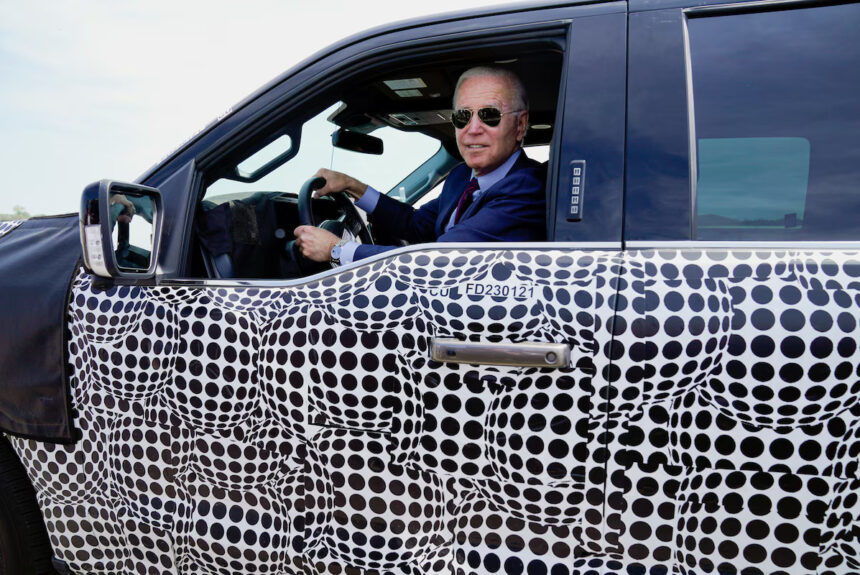A recent Gallup Poll found that 35% of Americans were considering buying an EV, a decline from 43% in 2023. While total EV ownership increased by three percentage points in the past year, from 4% to 7%, the percentage of Americans seriously considering buying an EV declined by the same amount, from 12% to 9%.
If any business or company faced this trend line, they would ring the alarm, pivot, and change their strategy. Not so with the government where the solution to failed state intervention is always more intervention.
>>>READ: What’s Going on with Electric Vehicles?
As my colleague Nick Loris rightly noted, our real frustration should be with the policies, mandates and subsidies that are hurting the environment and economy by creating new barriers to innovation. He writes, “Despite attempts to make the EV tax credit more equitable, it is far from it. Households that make $300,000 annually still qualify for the $7,500 tax credit. In effect, the subsidy goes to rich people who didn’t need the tax credit in the first place. Consequently, there is not a significant change in the number of EVs purchased and there is a high taxpayer cost for a modest amount of emissions reductions.”
The EV tax credit shows, once again, that the best way to make something expensive is for government to make it affordable.
Biden’s follow-on actions demonstrate his devout faith in state intervention. After the tax credit failed to make EVs affordable, Biden’s EPA issued a heavy-handed tailpipe emission regulation designed to crack down on internal combustion engines. It’s not hyperbolic to be concerned about Biden coming after your truck, especially if you live in a state like Alaska where it’s too cold to charge an EV. Then, when it became apparent his policies would incentivize China to flood the U.S. market with cheap EVs, he announced a 100% tariff on electric vehicles made in China.
When Biden couldn’t “fix” his failed subsidy with a bigger subsidy, he looked for other tools for state intervention – regulations and tariffs.
But Biden’s problem runs deeper than mere policy. As the EV debate illustrates, policies are built on a foundation of assumptions about human nature and the role of government.
>>>READ: Biden Administration’s Tariffs Will Hurt Consumers and Clean Energy Deployment
The policy decision tree deviates from this question: Who do you trust? Do you trust consumers, markets, and competition to reward and elevate innovators who deliver a superior product at an affordable price, or do you trust government to correct for “market failures?” Do you believe in people? Or do you believe in politicians? Everything hinges on that question of trust.
Biden seems to think that because, as Commander in Chief, he has the power to send troops into combat he also has the power to act as Car Dealer in Chief and force taxpayers into cars.
My fellow Freedom Conservative signatory John Hood captured the problem with blind and presumptuous policymaking:
Biden and many on the progressive left do not see the difference and continue to double down on coercion. Their delusional piety – they “care,” you see, and have baptized their coercion with good intentions – has led to a cascading sequence of bad policy decisions. Biden’s unwillingness to think critically and respond rationally and dispassionately to the overwhelming evidence of policy failure is creating more failures and delaying consumer acceptance of EVs.
Some of the backlash to EVs can be attributed to tribal and reactionary partisanship but that’s a minor factor. When government tries so very, very hard to make EVs popular, rational consumers rightly wonder what defect government is trying to hide and lose confidence. Restoring that trust will require the Biden administration to do a 180-degree pivot and believe in people over politicians.
Government can do many things to expedite the acceptance of EVs but less coercive and less direct policies will be more effective. For instance, if you want people who earn less than $300,000 to look at an EV, economic policies that truly reduce inflation will be more effective than policies that will make inflation worse, like more government spending and capital gains tax hikes. Making energy more abundant and cheaper by lowering barriers to American production will reduce the price of everything and make it easier for people to afford EVs. Helping American companies access and mine the critical minerals necessary for EV production will reassure consumers who don’t like slave labor.
I’m rooting for EVs and would like to have one someday, but I don’t see how a policy regime that essentially outlaws internal combustion engines will deliver that result. I have a farm and spend a lot of time in the city. Like a lot of consumers, I want both and will have a use for both for a very long time.
Policymakers should go back to their decision tree, check their assumptions, and choose freedom. Believing in people and trusting consumers will get EVs on the road much faster than any Car Dealer in Chief.
The views and opinions expressed are those of the author’s and do not necessarily reflect the official policy or position of C3.
